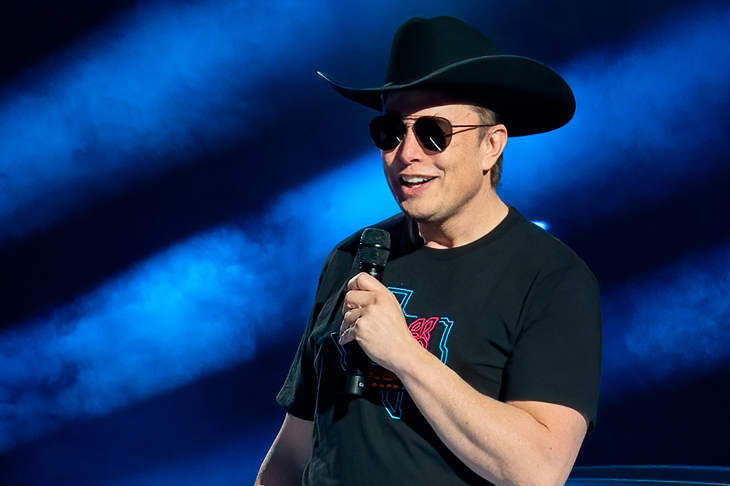Who amongst us can fail to be at least a little bit excited by the woodsy, earthy scent of musk lingering in the nostrils as one peruses the financial pages related to all things Big Tech? I refer not to the perfume, of course, but to the African-American billionaire. Yes, yes, yes, describing Mr Elon Musk in that way, though wholly accurate, will be seen as intentionally provocative by people whose censorious, virtue-signalling views more and more interest me not one whit. These days, with universities deliberately indulging in safe spaces, trigger warnings and the ruthless contraction of viewpoint diversity on campus, we need more offending not less. Arguably a lot more.
But back to Elon Musk, South African- born, partly Canadian-educated, now US citizen technology whiz who is not just a billionaire but by some accounts the wealthiest person on earth. Estimates seem to put his net worth at about US$300 billion. Last week Mr Musk offered to buy all Twitter shares for $54.20 a share. At a premium of over fifty per cent this would be a great price compared to what the share price was trading at just a couple of months ago when Musk started buying up shares. The offer amounts to something like a $43 billion takeover bid by Mr Musk. Put differently, Musk is prepared to spend about 14 per cent of his total wealth on this attempted takeover of Twitter. Better yet, Musk says this isn’t about making money. He says it’s about free speech; he sees Twitter as a sort of de facto ‘public square’; and he detests its current blatantly left-leaning bias when it comes to blocking and censoring what can appear, a bias that to this day blocks former US president Trump but not Russian President Putin, nor the mullahs in Iran, nor the Chinese politburo, not to mention Twitter’s blocking of conservative commentators and humour sites such as Babylon Bee, the latter daring to mock some of the idiocies of transgender political correctness.
Put simply, Musk is for any and all views being available on Twitter, up to what would be allowed to be expurgated under US First Amendment jurisprudence – meaning, basically, just the counselling of violence, child pornography and some other bits and pieces. Should he be successful Musk promises to make public and open for all to see the algorithm Twitter uses to decide what gets emphasised and blocked. At present Twitter refuses to release this algorithm (as do the other Big Tech giants when it comes to theirs). In fact, nothing about Musk’s promises as regards turning Twitter into a comparative bastion of free speech appears to favour one side of politics over the other. Or one set of views over others. He wants a John Stuart Mill-type cauldron of competing views being available, with this competition of views pushing better outcomes. (And in this writer’s view that is exactly what would have happened – better choices, better policies and better outcomes – if Twitter et al. had not censored lockdown sceptics who pointed out the massive costs and miniscule benefits of lockdowns and pushed from sight the worst inroads on our civil liberties in two or three hundred years.)
Well, you can imagine that many on the left of politics are not thrilled at the prospect of relinquishing their oversight of conservative views. That includes the board of Twitter, which prefers keeping in place the secrecy of its algorithm and its control over what can be said (by righties, to be clear, since lefties clearly can say what they like right now). Faced with Mr Musk’s generous share price takeover offer the board would very much have liked to find an alternative bidder. One of its current biggest shareholders is a Saudi Arabian prince who (surprise, surprise) rejected the Musk offer, with Musk then responding by asking (on Twitter) whether the Saudi Arabian could tell him how much of Twitter is owned by Saudi Arabia and what that kingdom’s views on journalistic free speech were.
Meantime neither the Prince nor anyone else looked like coming forward to compete with Mr Musk. So here’s where it got interesting. The Twitter board last week then voted, unanimously, to put in place a ‘poison pill’ provision – and doesn’t that unanimous, anti-free speech vote tell you all you need to know about what ‘diversity’ amounts to in the corporate board setting?
What the poison pill ploy means, in effect, is that as soon as Mr Musk reaches 15 per cent of the shares the board will issue new, cheaper shares. It will flood the market with new cheap shares, thereby diluting the African-American’s holding and making it near on impossible to seize control of the company. The Twitter chief executive, Parag Agrawal (whose job tenure would rank with the two-week life expectancy of Battle of Britain spitfire pilots should Musk prevail), said that the Twitter company refused to be ‘held hostage’ by the world’s richest man.
Now it’s been over three decades since I studied company law in law school but I can still remember the basics. The directors and board of a company have a fiduciary obligation, in effect, to the shareholders. It is they who own the company, not the managers (though this is less and less obvious these days). This poison pill arrangement could see shareholders lose out on very large share price profits. This is bound to see lawsuits galore, mostly directed at members of the Twitter board. Yes, for most things board members are insured against lawsuit liability, and in the US have more leeway to take this poison pill type action. But I’m not sure that’s the case when board members are explicitly disregarding the financial interests of shareholders in favour of their own financial interests and political views. And that sure looks like what is going on. Wait and watch what happens if Musk goes hostile with this bid. And wait for the shareholder lawsuits against the Twitter board for breach of fiduciary obligations. These could literally be bankrupting.
Yet these directors might be very worried that as a new owner Musk will discover the skeletons in the closet – the manipulated algorithm that shadow bans, blocks, etc., in one direction only.
Don’t forget that back just before the last US presidential election when the Hunter Biden laptop and its implicating of Joe Biden were made public by the oldest newspaper in the US, the New York Post, Twitter blocked all mentions of this story and any linking to that newspaper on the story.
After the election polls showed upwards of 17 per cent of Biden voters saying they’d have changed their votes had they known this laptop stuff. That’s in an election in which 40,000 votes all up separated Biden and Trump in the three states of Wisconsin, Arizona and Georgia (total population of those three being about 25 million), which if flipped would have seen Trump re-elected. So if Twitter managed to shift 20,001 votes by suppressing the laptop news it helped swing the election.
Got something to add? Join the discussion and comment below.
Get 10 issues for just $10
Subscribe to The Spectator Australia today for the next 10 magazine issues, plus full online access, for just $10.
You might disagree with half of it, but you’ll enjoy reading all of it. Try your first month for free, then just $2 a week for the remainder of your first year.














Comments
Don't miss out
Join the conversation with other Spectator Australia readers. Subscribe to leave a comment.
SUBSCRIBEAlready a subscriber? Log in